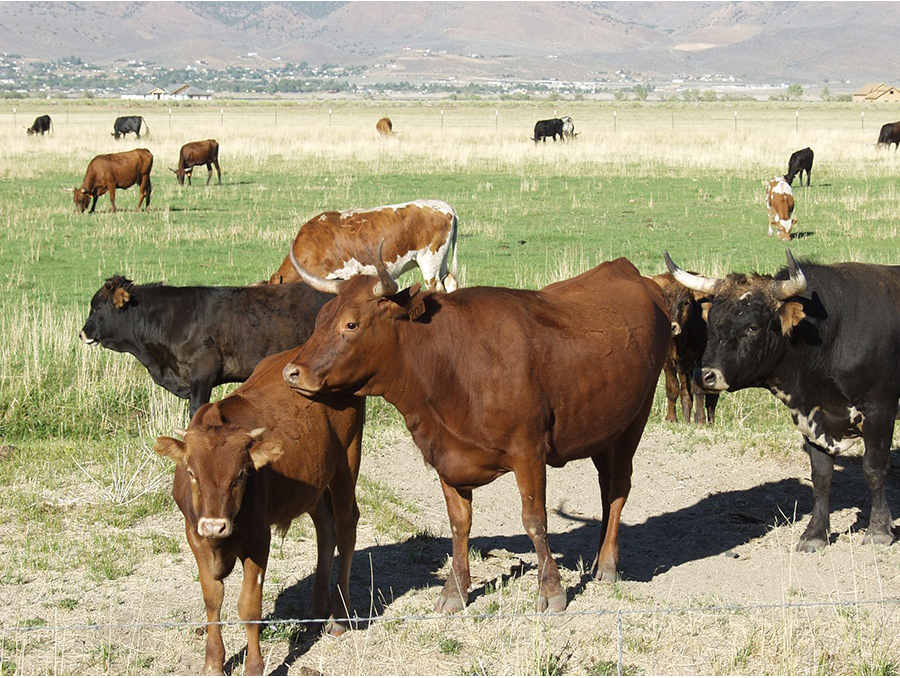The University of Nevada, Reno will host the annual Cattlemen’s Update in person and virtually in 2023, Jan. 9 – 13. For over 50 years, the University has held several sessions across Nevada in January to provide ranchers with current research-based information about issues that may affect the efficiency, productivity, profitability and sustainability of their businesses and Nevada’s cattle industry.
The five-day event, offered virtually on Jan. 9, and then in person at four locations across the state, is a partnership led by the University’s College of Agriculture, Biotechnology & Natural Resources, and its Extension and Experiment Station units. Other program partners include local sponsors, the U.S. Department of Agriculture’s Beginning Farmer and Rancher Development Program, and Western Center for Risk Management Education.
The topics for the in-person sessions will be moderated by Barry Perryman, researcher, professor and chair of the College’s Department of Agriculture, Veterinary & Rangeland Sciences. Jacob DeDecker, named the College’s associate dean for engagement and director of Extension in July, will welcome attendees and present some updates. Experts from the College and its Extension and Experiment Station units will discuss pertinent topics with participants, including:
- Next Grass to Worry About: Ventenata & Regional Grazing Study Results. From the College – Paul Meiman, Extension specialist, researcher and associate professor of rangeland livestock-wildlife interactions; and Lesley Morris, researcher and associate professor of rangeland ecology
- What is This Economy Going to Bring the Nevada Livestock Industry? Shannon Neibergs, USDA Western Extension Risk Management Education Center, Washington State University
- Photo Monitoring: A Simple, Easy and Valuable Monitoring Tool. From the College – Brad Schultz, Extension educator in Humboldt County, researcher and professor of rangeland ecology and management
- Trich in Cattle: Better to Test Than Have It. Randy Walstrum, veterinarian
- Impacts of Smoke on Animal Health. From the College – Mozart Fonseca, researcher and associate professor of veterinary & rangeland sciences
- USDA Farm Service Agency: Inflation Reduction Act (IRA) & Livestock Support Programs Nevada. USDA Farm Service Agency staff
This year’s schedule of sessions is:
- Jan. 9, 10 a.m., Virtual session, via Zoom only. Register for the session here.
- Jan. 10, 5:30 p.m., Fallon, Fallon Convention Center, 100 Campus Way, dinner provided
- Jan. 11, 5:30 p.m., Ely, Ely Convention Center, 150 W. Sixth St., dinner provided
- Jan. 12, 12:30 p.m., Elko, Dalling Hall, 600 Commercial St., dinner provided
- Jan. 13, 10 a.m., Winnemucca, Extension Office, 1085 Fairgrounds Road, lunch provided
Times given for the in-person sessions are registration times, with the program beginning 30 minutes later. The cost is $20 per ranch per location attended, which includes lunch or dinner and the “Red Book” recordkeeping guide for cattle producers. For more information, contact Staci Emm, Extension educator for Mineral County and the event’s organizer, at emms@unr.edu, 775-475-4227 or 775-312-0424; or Jamie Lee, at jamielee1@unr.edu or 775-426-8299. Persons in need of special accommodations or assistance should contact Paul Lessick, civil rights and compliance coordinator, at plessick@unr.edu or 702-257-5577 at least five days prior to the scheduled event with their needs or for more information.
















